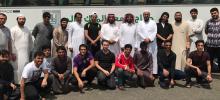A Consultant of Chronic Diseases at the University Offers 12 Tips for Diabetic Pilgrims

The Consultant of Sugar and Chronic Diseases at the Faculty of Medicine, Prof. Hassan Al Mousa, provided 12 tips for pilgrims who have diabetes. He stressed the need to follow and apply them carefully in order to complete the pilgrimage without the occurrence of high or low diabetes or drowsiness.
Al Mousa stated that one of the first instructions that the pilgrim should take care of is to visit his/her doctor to know if he/she is capable of performing Hajj. Then, the pilgrim should arrange treatment with the physician during the Hajj period and consult him/her. Moreover, diabetic patients in Al Hajj should have reports of their situations. Additionally, they should be aware of the symptoms and causes of high and low blood sugar levels and how to deal with them. They are also advised to identify the appropriate nutritional intake for them with a dietician during Hajj in order to avoid high and low blood sugar during the performance of rituals. He also advised the diabetic patients to carry a sufficient amount of diabetic medicines, insulin injections and to have a sugar analysis device.
In addition to that, Al Mousa advised the diabetic pilgrims always to carry a card and a report of his/her situation. So, he/she can get help if something bad happened ‘God Forbid.' He said, “In the event of strenuous physical activity, such as walking for extended periods of time during the performance of the rituals, the pilgrim should reduce the doses of treatment, whether sugar pills or insulin injections and he/she should take a meal before the performance of the rituals without having sweetened fluids."
He also noted the importance of continuously measuring blood sugar levels, wearing comfortable cotton clothes, having athletic footwear and using an umbrella to avoid sun rays while performing various Hajj rituals and the need to move away from crowded places.
At the end of his recommendations, Al Mousa concluded with advising the diabetic patients to visit their doctors after the Hajj journey especially if they had experienced symptoms or problems during the performance of rituals.









